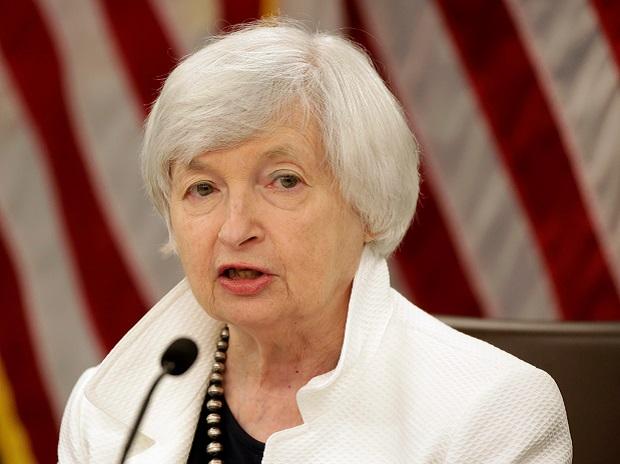On Friday, Treasury Secretary Janet Yellen visited Beijing in an effort to mend frayed ties between the two countries. While there, she voiced her displeasure with Chinese treatment of American businesses and the country’s new export curbs on metals used in semiconductors.
While speaking to a gathering of businesses, Yellen defended the United States’ export curbs on technology, despite criticism from Beijing.
She dismissed concerns that the United States government is aiming to untie the American economy from China’s.
Yellen was quoted as saying, “The US seeks healthy economic competition with China,” in a transcript given by her office.

Yellen has voiced her concern over China’s use of non-market mechanisms such increased subsidies for state-owned companies and domestic industries, as well as impediments to market access for international corporations.
Disagreements over technology and security, as well as Beijing’s military expansion, have contributed to the worst state of US-Chinese relations in decades.
According to the Treasury, on Friday, Yellen met with Yi Gang, the outgoing governor of China’s central bank, and Liu He, the outgoing Vice Premier and her former counterpart in financial discussions.
She was scheduled to meet with China’s second-in-command, Premier Li Qiang, later that day.
Officials from the Treasury Department had stated that Yellen would not be meeting with Xi Jinping. They predicted no progress will be made on major disagreements.
The Chinese finance ministry has hailed Yellen’s trip as a tangible step towards implementing the November agreement between President Xi and Vice President Joe Biden. It offered no hints about new approaches or potential compromises.
The ministry issued a statement saying that nobody benefits from trade wars or “decoupling and broken chains.” We look to the United States to take decisive measures to pave the way for the prosperous growth of our economic and trade ties.
Companies from the United States and other countries are nervous about operating in China in light of recent events, such as the raiding of consultancy firms, the development of a national security law, and calls from Chinese leader Xi Jinping and other authorities for greater self-sufficiency.
Yellen has expressed concern over the recent trend of retaliatory measures taken against American businesses.
The Chinese government is unhappy with the United States for restricting its access to high-end processing chips for security reasons.
This might stymie or even disrupt the Communist Party’s plans to advance telecoms, AI, and other technology.
In March, Xi said that Washington was seeking to slow China’s progress.
Beijing’s sluggish response could be due to concerns about the impact on the country’s own technological sectors.
Metals used in semiconductors and solar panels, gallium and germanium, will be subject to as-yet-undefined export regulations, the government stated this week.
South Korea and other countries who purchase from China were shocked by the news.
As Beijing and Washington tighten trade rules and push corporations to lessen reliance on each other, businesspeople have warned the world’s two largest economies may divide into separate marketplaces with incompatible products.
They worry it will stifle creativity and slow the economy.
“I have made clear that the United States does not seek a wholesale separation of our economies,” Yellen stated.
It would be extremely disruptive to the global economy if the world’s two greatest economies were to become economically independent of one another.
In response to Chinese claims that the United States is using export restrictions for political gain, Yellen defended these policies.
I also emphasised that any counter-Chinese economic measures we take will be targeted and based only on national security concerns, rather than being implemented for political benefit. Said Yellen.
Yellen is the second high-level American official to visit Beijing in as many years, following in the footsteps of Secretary of State Antony Blinken, who met with Xi last month.
Both sides promised to work towards restoring calm, but they couldn’t settle their differences over how to better coordinate their military.
Earlier in Washington, Department of Treasury officials told reporters that Secretary Mnuchin sought to challenge Chinese support for Russia’s invasion of Ukraine and stabilise the global economy.
The current conflict began when Vice President Joe Biden called Xi a dictator. Despite protests from the Chinese government, Vice President Biden declared, “I’m just not going to change very much” in his direct statements.
After a Chinese surveillance balloon sailed over American territory in February and was shot down, tensions between the two countries grew significantly.
John Kerry, Vice President Biden’s special envoy on climate change, will travel to China the following week, a State Department official said on Thursday.
Because of their respective positions as the world’s largest and second-largest emitters of carbon dioxide, China and the United States must take particularly decisive action.
China cut off climate talks with the United States in August in response to then-House Speaker Nancy Pelosi’s visit to Taiwan, thus this will be Kerry’s first trip to China since then.
Support InfoStride News' Credible Journalism: Only credible journalism can guarantee a fair, accountable and transparent society, including democracy and government. It involves a lot of efforts and money. We need your support. Click here to Donate
